

In today’s competitive market, standing out is a challenge. Building a strong brand is essential for creating barriers against competitors. A key element in establishing a robust brand identity is the careful crafting of distinctive Chinese brand names. Explore the significance of this crucial step in securing and maintaining market share.
Brands often aim to associate their brand name with a particular product category. For example, when a child wants a hamburger, he will often say he wants to go to McDonald’s. Similarly, when thinking of luxury luggage a Chinese consumer may think of Louis Vuitton. The reason behind these strong brand-product associations is that these companies have built strong brand identities in the minds of consumers. This strong presence results in a competitive advantage and is what makes a brand a valuable asset. That value is intimately tied with the brand name itself.
Even when companies acknowledge how important a brand name is, they often fail to pay sufficient attention to the cultural translation of their brand name in different parts of the world. In China, many foreign brands are present, and they often have Chinese brand names. But, as we discovered last year with the Digital IQ of prestige brands report (prepared in collaboration with L2), the majority of foreign brands are not digitally proficient in China. Furthermore, many brands do not monitor or understand the performance of their Chinese brand names online.
Chinese names are not only important on packaging, shop storefronts, and for word of mouth communication, but are hugely important for a brand’s online presence and brand image. Sometimes brands that haven’t even given themselves a Chinese name may find that netizens have already come up with one for them! Chinese consumers usually search for a product online before they purchase it. Thus, brands need a Chinese name, and once the name is established they need to monitor its progress online, for the reasons discussed below.
For those brands that already have a Chinese brand name, they may be surprised just how much it is used in searches online. For the multinational food brand Nestle, for example, only 11% of all Google searches from Mainland China use the English brand name “Nestle”, whereas 89% of searches use the Chinese name, “雀巢”.
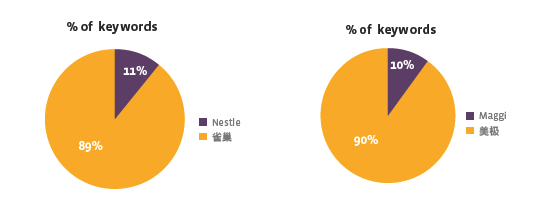
You can see a very similar breakdown for the Nestle-owned brand of soy sauce, Maggi.
You can also see the use of Maggi’s Chinese name increasing over the past 5 years. The increased use of Chinese names in web searches is a trend that is apparent across industries.
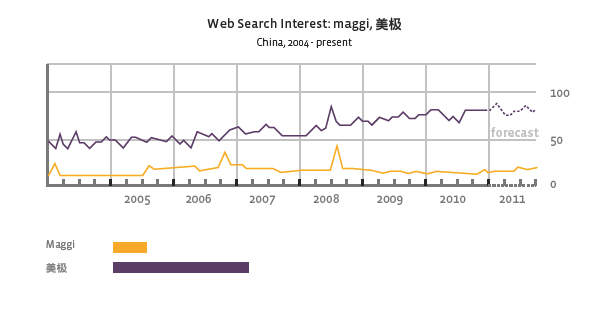
The same increase in Chinese name usage can be seen with the Chinese name for Volkswagen, 大众 (Dàzhòng), shown below.
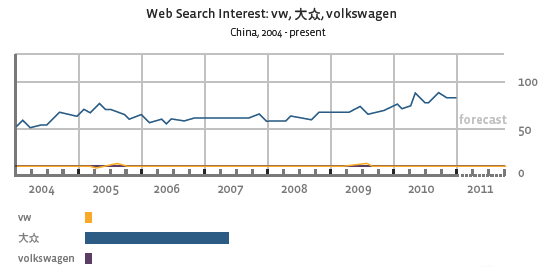
From the Maggi and VW examples, you can also see the provinces in China that account for the largest amount of search volume. This data can be helpful for brands to see the areas they have a strong foothold and the regions they may wish to increase their brand awareness.
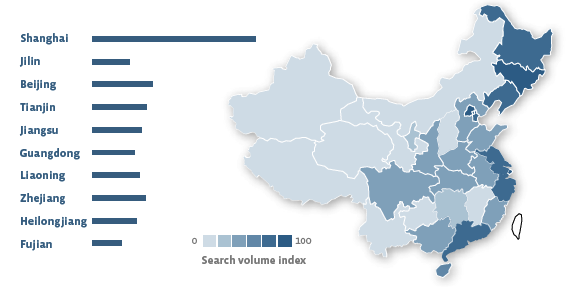
We can see that Chinese names are important, and that their use online is generally on the rise. But implementing a brand name is not a onetime effort; brands also need to monitor the online usage of their Chinese name over time.
Let’s take a look at the famous brand Louis Vuitton. Their Chinese name is路易威登 (Lùyì wēi dēng), and they are also referred to as “LV”. Interestingly, the acronym LV is currently more popular than the Chinese name in online searches, and has seen a rise in usage over time. This information could prompt Louis Vuitton to use the acronym more in their communications, or to try to increase the awareness of the Chinese name.
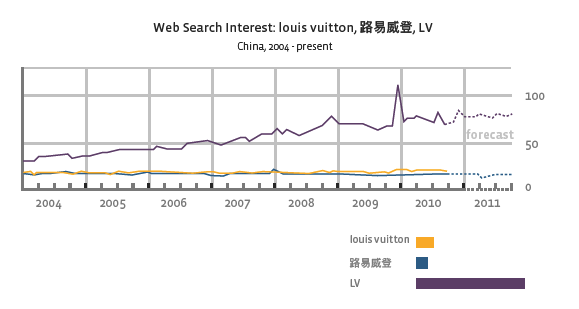
Paying attention to your Chinese brand name online will also reinforce other brand building efforts in the following ways:
To build a brand in the minds of consumers that is valuable both now and in the future, a strong brand name is essential. Like all assets, your brand needs to be managed. In the digital age where so much interaction between consumers and brands takes place online, it is essential that brands know how their names are being used online, not only in China, but around the globe.
DOWNLOAD REPORT
A Labbrand Group Company © 2005-2024 Labbrand All rights reserved
沪ICP备17001253号-3To improve your experience, we use cookies to provide social media features, offer you content that targets your particular interests, and analyse the performance of our advertising campaigns. By clicking on “Accept” you consent to all cookies. You also have the option to click “Reject” to limit the use of certain types of cookies. Please be aware that rejecting cookies may affect your website browsing experience and limit the use of some personalised features.